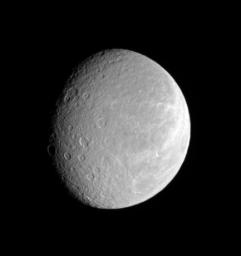
|
Accustomed to Her Face
- Click the image above for a larger view
- Full-Res JPEG (433 x 460) (11.7 kB)
- Full-Res TIFF (433 x 460) (199.6 kB)
Caption:
After nearly three years at Saturn, the Cassini spacecraft continues to observe the planet's retinue of icy moons, seeing exciting details with every orbit. Rhea's cratered face attests to its great age, while its bright wisps hint at tectonic activity in the past.
This view looks toward the moon's Saturn-facing hemisphere. North on Rhea (1,528 kilometers, or 949 miles across) is up and rotated about 8 degrees to the right.
The image was taken in visible light with the Cassini spacecraft narrow-angle camera on May 11, 2007. The view was acquired at a distance of approximately 879,000 kilometers (546,000 miles) from Rhea and at a Sun-Rhea-spacecraft, or phase, angle of 43 degrees. Image scale is 5 kilometers (3 miles) per pixel.
Background Info:
The Cassini-Huygens mission is a cooperative project of NASA, the European Space Agency and the Italian Space Agency. The Jet Propulsion Laboratory, a division of the California Institute of Technology in Pasadena, manages the mission for NASA's Science Mission Directorate, Washington, D.C. The Cassini orbiter and its two onboard cameras were designed, developed and assembled at JPL. The imaging operations center is based at the Space Science Institute in Boulder, Colo.
For more information about the Cassini-Huygens mission visit http://saturn.jpl.nasa.gov/home/index.cfm . The Cassini imaging team homepage is at http://ciclops.org .
Cataloging Keywords:
| Name | Value | Additional Values |
|---|---|---|
| Target | Rhea | Saturn |
| System | Saturn | |
| Target Type | Satellite | Planet |
| Mission | Cassini-Huygens | |
| Instrument Host | Cassini Orbiter | |
| Host Type | Orbiter | |
| Instrument | Imaging Science Subsystem (ISS) | |
| Detector | Narrow Angle Camera | |
| Extra Keywords | Crater, Grayscale, Rotation, Visual | |
| Acquisition Date | ||
| Release Date | 2007-06-26 | |
| Date in Caption | 2007-05-11 | |
| Image Credit | NASA/JPL/Space Science Institute | |
| Source | photojournal.jpl.nasa.gov/catalog/PIA08970 | |
| Identifier | PIA08970 | |
